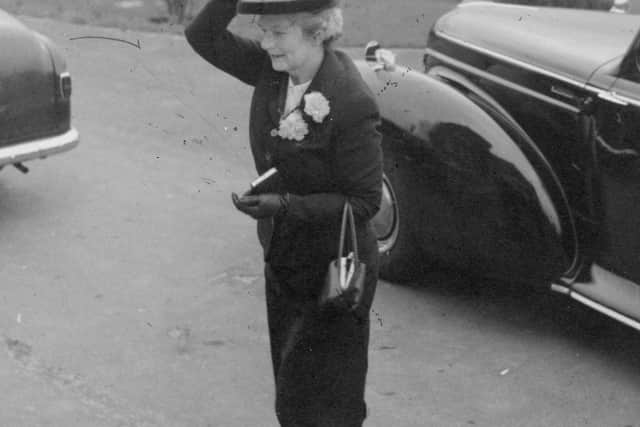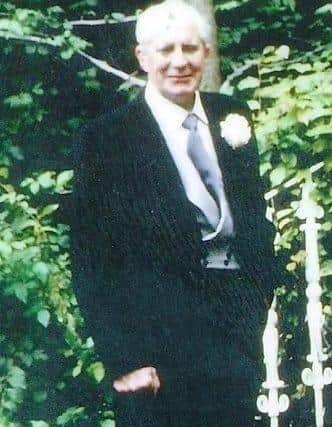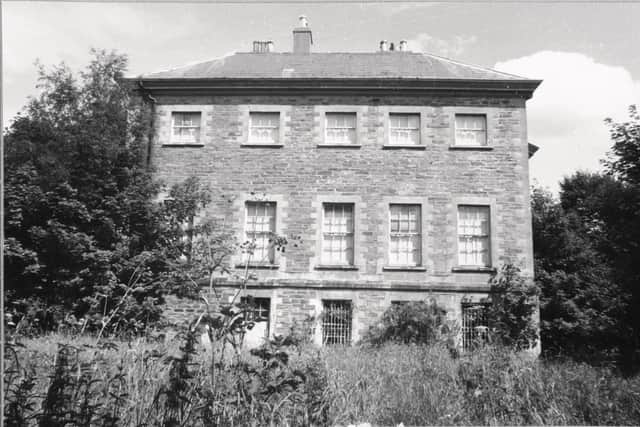Remembering the benevolent McDevitt family of Boomhall
and live on Freeview channel 276
The McDevitts originally hailed from Ardara in south-west Donegal.
It was from there in the mid-19th century that Patrick McDevitt, assembling his sock-making skills and business nous, moved to Feeny (near Dungiven) and, then, to Ardmore in Co. Derry.
Advertisement
Hide AdAdvertisement
Hide AdHis first son, Michael, developed the business further and, eventually, moved to Derry City in the latter part of the century.


At a time when it was difficult for Catholics to make a success in life, the business that Michael McDevitt developed earned him respect among his own community. He was regarded as a man of drive and determination in a field that had, for long, been mainly the preserve of the Protestant merchant class.
Reflecting the respect he secured among the wider community, Michael was appointed a Justice of the Peace - a rare honour to be bestowed on a Catholic in that era.
At the turn of the century, the family lived at Ebrington Terrace in the Waterside and later moved to Duke Street where they established a retail premises.
Advertisement
Hide AdAdvertisement
Hide AdMichael married Ellen Hegarty whose family owned a chemist’s shop in the city. It was located in the Diamond in theheart of the city centre – again a rarity for a Catholic family at the time. Ellen and Michael had seven children: Mary, Michael, Annette, Patrick, Marcella and two children who sadly died in infancy.


Ellen was known to be quite a formidable woman whom one crossed at one’s peril. All it took was a look from her to turn a person to stone, it was said! Her husband looked after the business to allow domestic and family matters to be the sole domain of Ellen.
Before moving to live in Boomhall in the early 1930s, the family bought a house in the pleasant seaside village of Castlerock, a few miles from Coleraine. It was said to have been built in the mid-19th century by the owner of Downhill Castle (and latterly Mussenden Temple), the Earl of Bristol, for his mistress!
It was originally given the decidedly imperial name of Trafalgar Lodge. Not long after moving in, the McDevitts changed the name to Red House, the predominant colour of the house.
Advertisement
Hide AdAdvertisement
Hide AdIt was in the early 1930s that the McDevitts first moved into Boomhall. Their sock-making business was progressing well on the strength of good workmanship, effective marketing and a few key contracts. Indeed, such was their growing reputation that, during World War Two, the McDevitts won a lucrative contract for the supply of socks to the Royal Air Force.


As with many larger properties during wartime, Boomhall was commandeered by the armed forces, in this particular case by the Womens’ Royal Navy Service or, as they were more widely known, the Wrens.
Reclaiming the property after the war, the family was none too pleased with the amount of repair work that was required to return it to its pre-war state.
For a number of years, the McDevitts rented the property from the then owners, the Maturin Baird family. I have seen the long exchange of letters between the McDevitts and the Maturin Bairds and their respective solicitors from the 1930s and 1940s in relation to a putative sale of the property to the McDevitts. A sale was eventually agreed in the late 1940s and the property passed into McDevitt hands.
Advertisement
Hide AdAdvertisement
Hide AdDerry citizens of a certain vintage will remember the family’s shop on Duke Street and its factory in William Street. The Duke Street premises was a popular shop for buying men’s and women’s clothes and William Street was the location of the sock factory.
It was outside the family’s Duke Street premises that the first incidents of the Troubles took place after a civil rights march in the late 1960s. The William Street factory was damaged in a bombing in the 1970s. Like many Derry families, the McDevitts experienced directly the effects of the Troubles.
The McDevitts were noted for their strong devotion to their religious faith, while also having many close friends from other faiths. Tolerance and benevolence were their hallmarks as a family.
Michael, the eldest son, became the main director of the company following the death of his father and his brother, Patrick, was a junior partner. Michael was serious and business-like but also kind and warm. Patrick was jovial, a keen sportsman and a good raconteur. Both attended St. Columb’s College before going to Clongowes Wood College, Dublin, shortly before World War One.
Advertisement
Hide AdAdvertisement
Hide AdThe eldest sibling, Mary, married William Keohane, a doctor from Derry and Dublin. Their honeymoon, interestingly, took place in the Isle of Man, a popular destination for newly-weds at the time and long before the famous TT races.
Annette, like her sister, was quite academic and well-read. She and Mary were among the first women to attend the National University of Ireland in the early part of the 20th century when they both entered University College, Dublin. All three McDevitt sisters went to boarding school in Dublin.
Before her marriage, Mary spent some time teaching in a school in Wordsworth country, Windermere in the English Lake District, while Annette taught at Thornhill College for many years. The school was only a stone’s throw from Boomhall - no excuses for being late in the morning!
Annette fondly remembered many of her young pupils - one in particular, Nell McCafferty, who, she said, showed a great interest in and talent at English. In her own memoirs, Nell makes a glowing reference to Annette whom she also referred to as ‘tweedy and aristocratic.’
Advertisement
Hide AdAdvertisement
Hide AdIn 1970, Rosemary Brown (Dana) won the Eurovision Song Contest for Ireland and Annette, along with the rest of Derry, was thrilled for the young girl from Thornhill College.
Rare for women of her time, Annette smoked cigarettes and drove her own car. Her younger sister, Marcella, was a good golfer (playing at Prehen and Castlerock) and bridge player who had many friends in Derry city and county. Many parties were held over the years at Boomhall, playwright Brian Friel and journalist Cathal O’Shannon among the guests.
The McDevitts were all keen golfers and bridge players. They often travelled to Dublin and other towns across Ireland to compete in bridge congresses. During wartime, these trips were often restricted. However, it did not prevent Michael from visiting Dublin occasionally to collect delicious cakes and buns from the famous ‘Teatime Express’ for family consumption in a ration-weary Derry!
On one occasion, on a trip to Dublin in the 1940s, they were sitting in the lounge of the Gresham Hotel and who should walk in to the lounge but Laurel and Hardy, the equivalent of media rock stars at the time.
Advertisement
Hide AdAdvertisement
Hide AdNot long after purchasing Boomhall, Michael McDevitt was approached by local member of the Orange Order to see whether he would be prepared to sell two old cannons which had been part of the property since the 1689 Siege.
Michael politely but firmly refused the request on the grounds that, while they may have been controversial items of history, they did form an integral part of the property and should remain.
The cannons have, however, long disappeared, but to this day, the boom stone that secured the boom over the Foyle during the Siege, remains.
The McDevitts were prolific readers, whether of books or newspapers. Each day, they would read the ‘Irish News’, the ‘Irish Independent’ and the ‘Irish Press’. On Sundays, it was the ‘Sunday Independent’, the ‘Sunday Press’, the ‘Sunday Times’ and the ‘Sunday Express’. One paper never to darken the door of Boomhall, however, was the ‘Daily Mail’ which was noted for its very anti-Irish slant during and after World War Two. The family also regularly subscribed to the ‘Derry Journal’ and a number of religious newsletters.
Advertisement
Hide AdAdvertisement
Hide AdAn intriguing fact is that, with the exception of Mary, the eldest, none of that generation of the McDevitts ever married – wedded, as they were, either to business or their individual vocations in life. All the McDevitts were well-liked among the whole community, seen as tolerant and benevolent, good employers and good civic figures. They were proud of their city, their county and of Ireland.
The great tragedy was the demise of Boomhall after they moved to live in Castlerock in their advanced years. Many questions over the decline of the property remain unanswered. That said, Boomhall has not been forgotten. The Boomhall Trust has been established and, with the committed and capable Bart and Patricia O’Donnell at the helm, is doing sterling work in seeking to revive interest in one of Derry’s notable historical landmarks.
○ Paul McElhinney is a writer and lecturer living in Wexford. Related to the McDevitts of Boomhall, he lived there briefly in the 1960s. He has worked in Dublin, London and Washington, including eight years working in the Department of the Taoiseach.